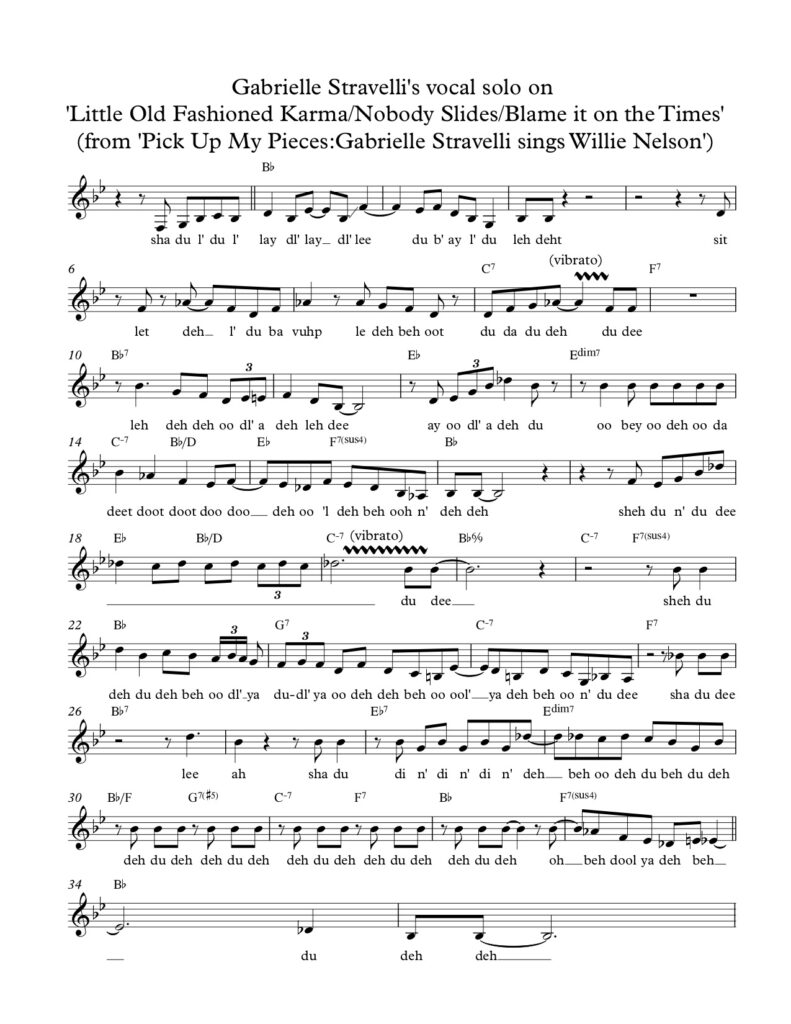Gabrielle Stravelli is a New York City based vocalist and songwriter who I had the honor of performing with in 2016. She has recorded jazz interpretations of a wide range of songs, from the ‘standard’ jazz repertoire of Berlin/Porter/Rodgers/Ellington et. al. to composers less often found in the jazz canon such as Bob Marley and John Fogerty. With her most recent release, ‘Pick Up My Pieces: Gabrielle Stravelli sings Willie Nelson’, she became perhaps the only artist to devote an album to exploring the jazz potential in the songs by this country icon, and the results, thanks to her gorgeous singing as well as great arranging by bassist Pat O’Leary and great playing by musicians including saxophonist Scott Robinson and pianist Art Hirahara, are beautifully surprising. Gabrielle has a seemingly effortless ability to execute acrobatic melody lines; this can be heard in the song Little Zochee from her 2017 album ‘Dream Ago’, an O’Leary composition on which she sings both a complex melody and a complex vocalese section doubling a Thomas Chapin flute solo note for note. On another tune from ‘Dream Ago’, ‘Bicycle Blues’, she adapts the vocalese approach to a duo setting, doubling Art Hirahara’s piano solo with with vocalist Kenny Washington. A live video of ‘I’m Just A Lucky So And So’ is a good example of her ability to ingeniously reshape the melodic line of a well-traveled standard tune.
The Karma Medley from ‘Pick Up My Pieces’ is made up of three Nelson tunes; two of these (‘A Little Old Fashioned Karma’ and ‘Nobody Slides’) use the 16 bar ‘gospel blues’ progression which also is found in jazz tunes including Sonny Rollins’s ‘Doxy’, Horace Silver’s ‘The Preacher’ and Jerome Richardson’s ‘Groove Merchant’. (I’ll be sharing my own entry in the ‘jazz gospel blues’ category in an upcoming post.) In this performance, after singing the first two tunes, Stravelli demonstrates her mastery of the scat vocal solo. This solo is a model of a swinging eighth-note based line; Gabrielle maintains a sense of forward motion by beginning phrases on the upbeat, and uses a wide variety of syllables to achieve a wide range of articulations. The first sixteen bars of the solo land clearly on the large-scale goals of the chord progression (I, IV and V chords). In the second chorus Stravelli outlines the G7 chord, which in this context is more of a passing chord. She does this with a phrase at m. 22-24 in which the last eight notes match m. 5-6 of Denzil Best’s ‘Move’, but with one note removed and two notes reversed. For me, this is a great example the kind of creativity with standard patterns that the musical Scrabble game of bebop requires. (Duke Ellington has been quoted as saying: ‘Playing ‘bop’ is like playing Scrabble with all the vowels missing.’) Versions and fragments of this standard piece of improvisational language can be heard throughout jazz history from Louis Armstrong’s ‘Hotter Than That‘ vocal solo to Miles Davis’ solo on ‘Oleo‘ (from ‘Miles Davis and the Modern Jazz Giants) solo to Clark Terry’s ‘Perdido Line‘. (All the linked examples are cued to the use of this melodic idea.) I hope the samples of Gabrielle Stravelli’s music in this post will lead you to check out more of her videos, albums, and live performances which are always adventurous and rewarding listening. Her YouTube show The Early Set, where she interviews fellow musicians, is also well worth checking out.
